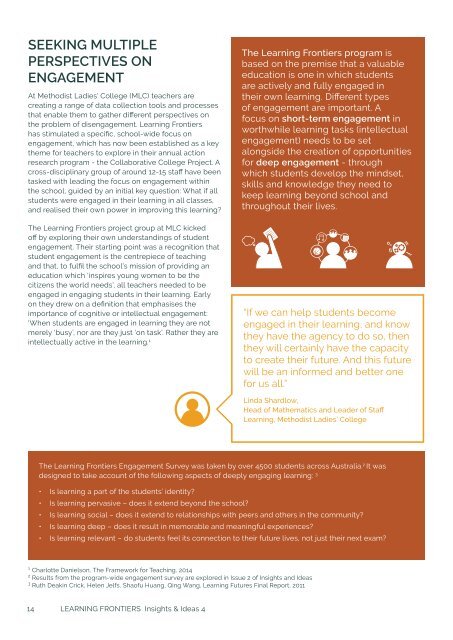LEARNING FRONTIERS
SEc31
SEc31
You also want an ePaper? Increase the reach of your titles
YUMPU automatically turns print PDFs into web optimized ePapers that Google loves.
SEEKING MULTIPLE<br />
PERSPECTIVES ON<br />
ENGAGEMENT<br />
At Methodist Ladies’ College (MLC) teachers are<br />
creating a range of data collection tools and processes<br />
that enable them to gather different perspectives on<br />
the problem of disengagement. Learning Frontiers<br />
has stimulated a specific, school-wide focus on<br />
engagement, which has now been established as a key<br />
theme for teachers to explore in their annual action<br />
research program - the Collaborative College Project. A<br />
cross-disciplinary group of around 12-15 staff have been<br />
tasked with leading the focus on engagement within<br />
the school, guided by an initial key question: What if all<br />
students were engaged in their learning in all classes,<br />
and realised their own power in improving this learning?<br />
The Learning Frontiers project group at MLC kicked<br />
off by exploring their own understandings of student<br />
engagement. Their starting point was a recognition that<br />
student engagement is the centrepiece of teaching<br />
and that, to fulfil the school’s mission of providing an<br />
education which ‘inspires young women to be the<br />
citizens the world needs’, all teachers needed to be<br />
engaged in engaging students in their learning. Early<br />
on they drew on a definition that emphasises the<br />
importance of cognitive or intellectual engagement:<br />
‘When students are engaged in learning they are not<br />
merely ‘busy’, nor are they just ‘on task’. Rather they are<br />
intellectually active in the learning. 1<br />
The Learning Frontiers program is<br />
based on the premise that a valuable<br />
education is one in which students<br />
are actively and fully engaged in<br />
their own learning. Different types<br />
of engagement are important. A<br />
focus on short-term engagement in<br />
worthwhile learning tasks (intellectual<br />
engagement) needs to be set<br />
alongside the creation of opportunities<br />
for deep engagement - through<br />
which students develop the mindset,<br />
skills and knowledge they need to<br />
keep learning beyond school and<br />
throughout their lives.<br />
“If we can help students become<br />
engaged in their learning, and know<br />
they have the agency to do so, then<br />
they will certainly have the capacity<br />
to create their future. And this future<br />
will be an informed and better one<br />
for us all.”<br />
Linda Shardlow,<br />
Head of Mathematics and Leader of Staff<br />
Learning, Methodist Ladies’ College<br />
The Learning Frontiers Engagement Survey was taken by over 4500 students across Australia. 2 It was<br />
designed to take account of the following aspects of deeply engaging learning: 3<br />
• Is learning a part of the students’ identity?<br />
• Is learning pervasive – does it extend beyond the school?<br />
• Is learning social – does it extend to relationships with peers and others in the community?<br />
• Is learning deep – does it result in memorable and meaningful experiences?<br />
• Is learning relevant – do students feel its connection to their future lives, not just their next exam?<br />
1<br />
Charlotte Danielson, The Framework for Teaching, 2014<br />
2<br />
Results from the program-wide engagement survey are explored in Issue 2 of Insights and Ideas<br />
3<br />
Ruth Deakin Crick, Helen Jelfs, Shaofu Huang, Qing Wang, Learning Futures Final Report, 2011<br />
14 <strong>LEARNING</strong> <strong>FRONTIERS</strong> Insights & Ideas 4


